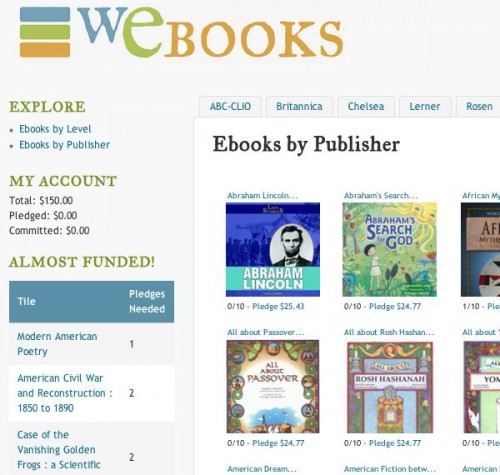Buying ebooks cooperatively in a large district or consortium makes the most of every dollar, but it’s not easy to ensure that everyone feels invested and involved in the selection process. To solve this, the school library system of the Genesee Valley Educational Partnership built a new ebook system showcasing some ideas I wrote about in “A Call for Fair Ebook Pricing” (November 2012) and “A Call for ‘Blended Funding’” (December 2012). The result is WEBOOKS, recently named a Cutting Edge Technology Project by the American Library Association’s 21st-Century Libraries Committee.
 It made sense to band together to buy ebooks as a single region rather than purchasing as 22 small districts. Buying as a group helped, but our rural schools still didn’t have new money to spend on ebooks. For this project, a blended-funding solution meant starting with librarians, allocating a portion of their existing state library materials aid to the regional purchases while seeking additional resources from classroom or textbook funding.
It made sense to band together to buy ebooks as a single region rather than purchasing as 22 small districts. Buying as a group helped, but our rural schools still didn’t have new money to spend on ebooks. For this project, a blended-funding solution meant starting with librarians, allocating a portion of their existing state library materials aid to the regional purchases while seeking additional resources from classroom or textbook funding.
The goal was twofold: pool money from individual libraries to leverage group purchasing, and increase the efficient use of existing funding. New York State provides $6.25 in state aid per student to each district for library materials. Asking librarians to give up even 10 percent or 20 percent of their limited book budgets was met with entirely reasonable resistance. For this plan to work, participating librarians had to retain control of their money throughout the selection process.
Working together with our librarians, we found inspiration in crowd-sourced funding sites like Kickstarter.com. On Kickstarter, people post projects to raise money from individual donors. For example, the Harvey Pekar Estate crowd-funded the creation of a memorial statue of the comic book author for the Cleveland Heights public library. Kickstarter’s site tracks pledges until the fundraising goal is reached. Then, people who pledged are charged and the project receives the money. We thought we could use a similar crowd-funding method to let librarians select books in a consortium.
The process we settled on is based on the regional price break point, when the number of individual libraries buying the ebook for their building meets the cost of buying the book for the whole region. For example, an ebook might cost one library $20 and the region $200. If 10 libraries plan on buying that book, we might as well pool the money and buy it for the region. Our selection tool is built around pledges; librarians indicate that they would allocate their money to buy the book individually. When the number of pledges reaches the set break point, the book is purchased for the region by pulling in the pledges, which will fund it.
This couldn’t have worked without three keys. First, our member librarians helped us find a delicate balance between a library giving up some limited funding and retaining control. We also credit the publishers that were willing to consider a new business model and provide regional pricing: ABC-CLIO, Britannica, Chelsea House, Lerner, and Rosen. The final key was Mackin, which worked with publishers on pricing to make this regional buying possible. Mackin’s VIA platform for digital content will give the kids in our region easy access to the collection on computers, iPads, and Android tablets.
Working through an aggregator was a deliberate choice. I might have been able to get lower prices directly from publishers and my amazing team could probably have developed a reading platform, but I wanted this project to be replicable and sustainable. I believe that this model can work for districts and consortia around the country.
Christopher Harris (infomancy@gmail.com) is coordinator of the school library system of the Genesee Valley (NY) Educational Partnership.


